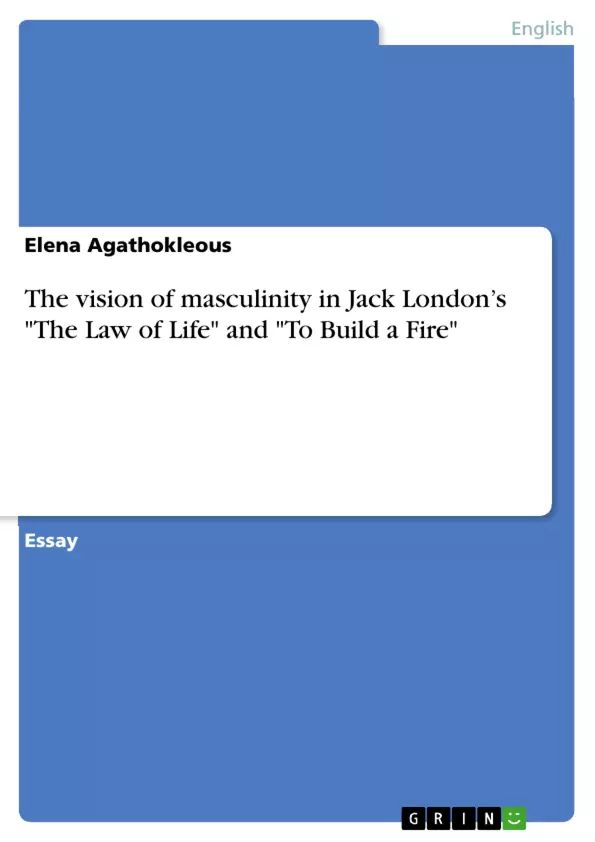Jack London’s short stories “To build a fire” and “The law of nature” both deal with two men who are two distinctly different characters both in a struggle with nature’s mercilessness and by comparing the two stories we can infer what London believed about being a man in 1900 America.
Jack London was characterized as a naturalist writer because of his ability to write about nature realistically and mainly out of experience while at the same time he explored the issue of masculinity. Through the adversities of nature in London’s texts men are found in dire situations which push them to reveal their true self. London’s male protagonists are very often on a course through which they come against natural forces able to destroy them and very often men are led to their demise by their greatest enemy, nature. The idea of men’s struggle against hostile nature is persistent in London’s work which at times also stresses man’s weaknesses and limits.
Table of Contents
- The vision of masculinity in Jack London's "The Law of Life" and "To Build a Fire"
- Introduction
- To Build a Fire
- The Law of Life
- Conclusion
Objectives and Key Themes
This text examines the vision of masculinity presented in Jack London's short stories "To Build a Fire" and "The Law of Life," analyzing how these stories reflect social anxieties about masculinity in early 20th century America.
- The social construction of masculinity in the early 20th century
- The role of nature in shaping masculinity
- The relationship between experience, knowledge, and survival
- The dangers of arrogance and blind determination
- The stoic acceptance of fate in the face of death
Chapter Summaries
The first chapter provides an overview of the social context surrounding the construction of masculinity in the early 20th century, highlighting anxieties about men being feminized due to societal changes. The chapter also establishes the significance of nature as a symbol of both masculinity and the threat to it.
The second chapter focuses on "To Build a Fire," exploring the story's portrayal of a man who overestimates his own abilities and disregards warnings from those with greater experience. The story serves as a cautionary tale against arrogance and blind determination, demonstrating the importance of knowledge and preparation in overcoming nature's challenges.
The third chapter examines "The Law of Life," which tells the story of an old Indian man who is left behind to die by his tribe. Through this character, London explores the themes of stoic acceptance of fate and the inevitability of death. The chapter also emphasizes the harshness of nature and the importance of adapting to its laws.
Keywords
This text focuses on the concepts of masculinity, nature, survival, experience, arrogance, stoicism, and the natural world as a symbol of both threat and opportunity. It examines Jack London's works through the lens of early 20th century social anxieties about changing conceptions of masculinity and the role of nature in shaping these perceptions.
Frequently Asked Questions
How does Jack London define masculinity in his stories?
London portrays masculinity through a man's struggle against nature, emphasizing the importance of experience, stoicism, and the limits of human power.
What is the central conflict in "To Build a Fire"?
The conflict lies between a man's arrogance and the merciless cold of the Yukon, leading to his demise because he disregards the wisdom of experience.
What does "The Law of Life" teach about fate?
It explores the stoic acceptance of death as a natural law, showing an old man left behind by his tribe who accepts his fate without bitterness.
Why is Jack London considered a "naturalist" writer?
London is known for his realistic and often harsh descriptions of nature based on his own experiences, viewing humans as subject to natural forces beyond their control.
How did early 20th-century social anxieties influence London's work?
The stories reflect concerns about the "feminization" of men in modern society, using the wilderness as a testing ground to reveal a man's true, primal self.
- Quote paper
- Elena Agathokleous (Author), 2021, The vision of masculinity in Jack London’s "The Law of Life" and "To Build a Fire", Munich, GRIN Verlag, https://www.hausarbeiten.de/document/1007719


